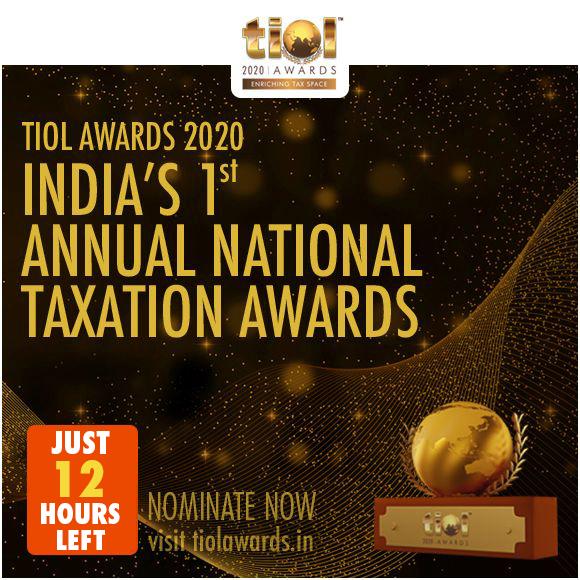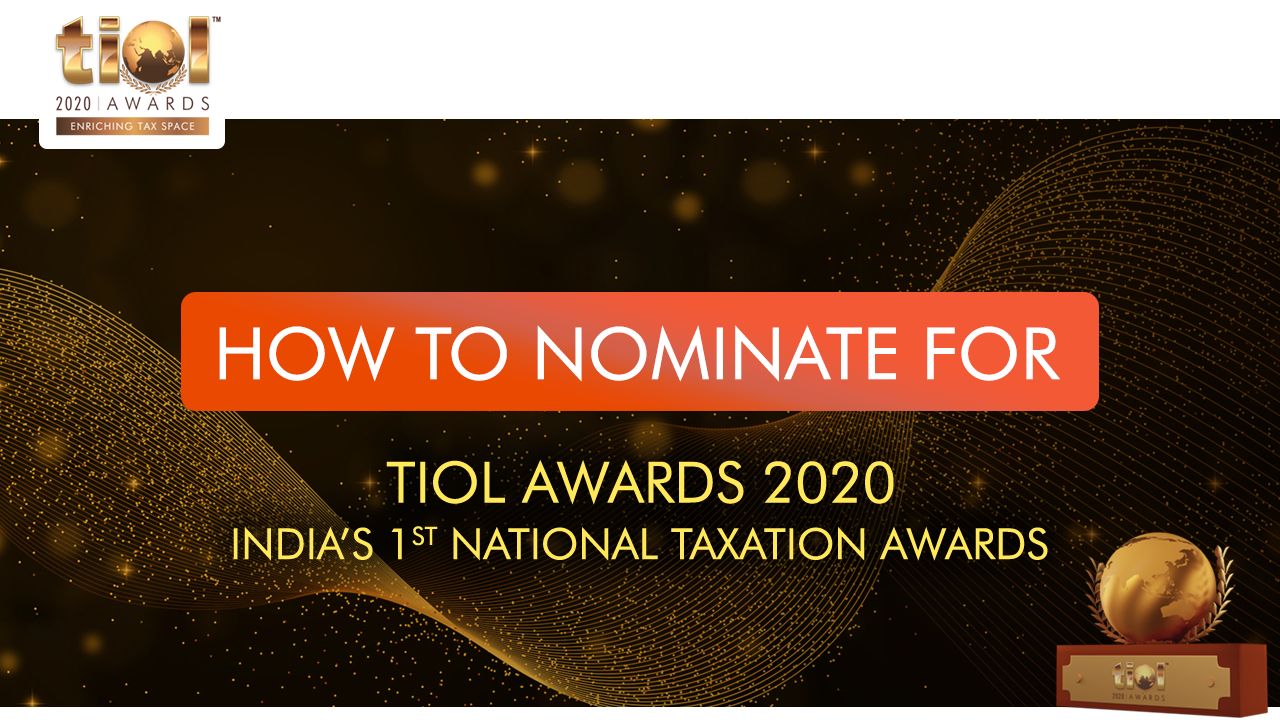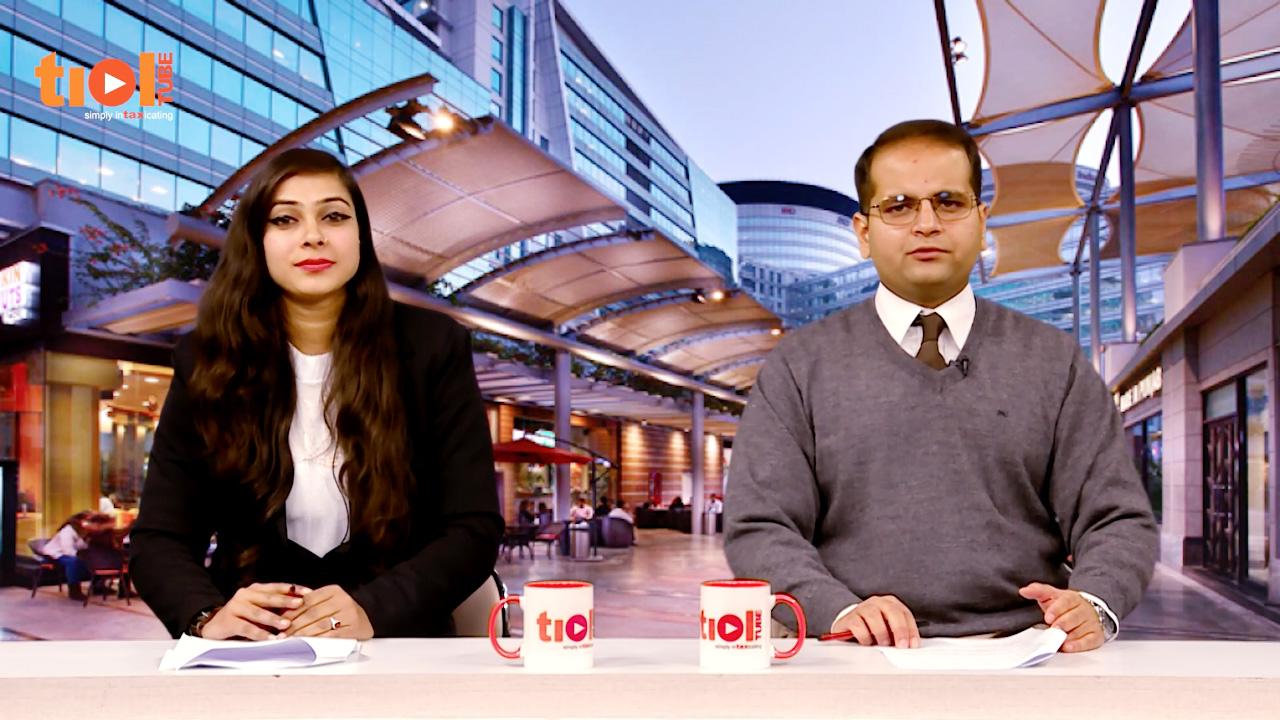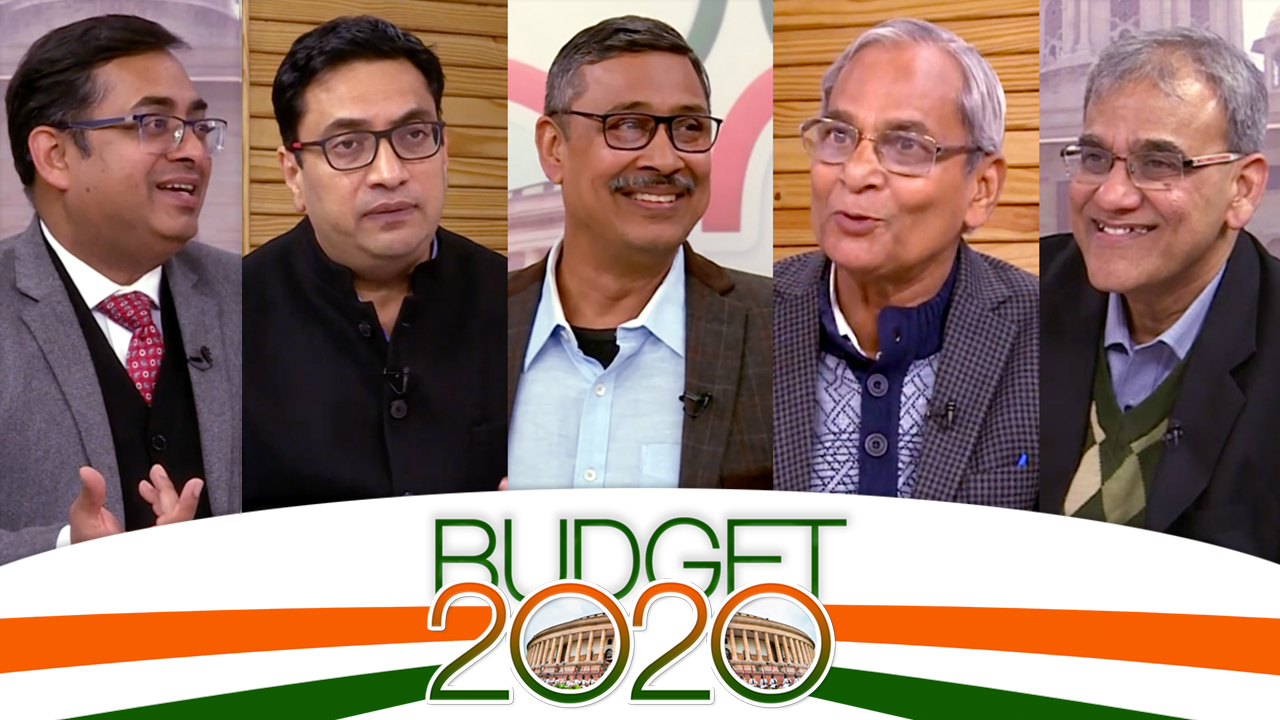 |
 |
2020-TIOL-NEWS-027| Friday January 31, 2020 |
 |
 |
Dear Member,
Sending following links. Warm Regards,
TIOL Content Team
TIOL PRIVATE LIMITED.
For assistance please call us at + 91 850 600 0282 or email us at helpdesk@tiol.in. |
 |
|
 |
 |
 |
TIOL TUBE VIDEO |
 |
|
 |
DIRECT TAX |
 |
|
 |
 |
 |
 |
 |
 |
 |
|
2020-TIOL-195-HC-AHM-IT PR CIT Vs Forever Gems Pvt Ltd
Whether provisions of Section 43A dealing with capital account transactions, would apply in circumstances not involving any long term loan liability & where fixed assets are of negligible value - NO: HC
- Revenue's appeal dismissed: GUJARAT HIGH COURT
2020-TIOL-194-HC-DEL-IT
Hopewin Admark And Consultancy Services Pvt Ltd Vs Pr.CIT
Whether if in remand proceedings AO fails to consider submissions advanced by the assessee and appeal preferred to the CIT(A) is still pending, then Court can direct CIT(A) to consider submissions made by the assessee - YES : ITAT
- Assessee's appeal dismissed: DELHI HIGH COURT
2020-TIOL-174-ITAT-MUM
Cyrus Investment Pvt Ltd Vs ACIT
Whether without explaining incorrectness of suomoto disallowance made by the assessee, AO can increase amount of disallowance u/s 14A r.w rule 8D - NO : ITAT
- Assessee's appeal allowed: MUMBAI ITAT
2020-TIOL-173-ITAT-MUM
Greatship India Ltd Vs DCIT
Whether credit for the tax deducted at source has to be allowed despite the absence of assessable income in a particular year - NO : ITAT
- Assessee's appeal allowed: MUMBAI ITAT
2020-TIOL-172-ITAT-MUM
Technopolis Premises Cooperative Society Ltd Vs Pr.CIT
Whether interest income earned on investments with co-operative banks is eligible for deduction u/s 80P(2)(d) - YES : ITAT
Whether while computing adjusted total income, amount is not to be increased by deduction claimed u/s 80P - YES : ITAT
- Assessee's appeal allowed: MUMBAI ITAT
2020-TIOL-171-ITAT-DEL
Aerens Projects And Infrastructure Pvt Ltd Vs ACIT
Whether by producing directors of investor companies for recording their statements and by producing evidence to satisfy AO regarding identity and creditworthiness of investor companies, assessee can avoid addition u/s 68 - YES : ITAT
- Case Remanded: DELHI ITAT
2020-TIOL-170-ITAT-HYD
Shankar Engineering Fabricators Vs ITO
Whether if labour charges paid excluding reimbursement of material and transportation cost is less than Rs.50,000 to each person, then no TDS is required and no disallowance u/s 40(a)(ia) is attracted - YES : ITAT
- Case Remanded: HYDERABAD ITAT | |
|
 |
   |
 |
|
 |
 |
GST CASES |
 |
|
 |
 |
 |
 |
 |
 |
 |
|
2020-TIOL-199-HC-MAD-GST
Ideal Movers Pvt Ltd Vs State Tax Officer
GST - Petitioner is a transporter and had been engaged to transport a consignment by Essar Steel India Limited (consignor) from Kancheepuram District to one Neel Metal Products Ltd. (consignee) situated at Krishnagiri District - Consignment was accompanied by invoices - An e-way bill had been generated on 12.01.2020 at 7:23 p.m., valid till 16.01.2020 - However, the lorry had broken down on 13.01.2020 with major gear box damage near Vellore and was thus lying in Vellore at one Lawrence Automotive Private Limited, who vide certificate dated 16.01.2020 confirmed this position and also stated that the delay in carrying out the repair was on account of the intervening Pongal holidays - After repair, the lorry proceeded to deliver the goods to the destination, however, accompanied by the e-way bill that had expired/lapsed on 16.01.2020 itself. The lorry was intercepted at Vellore and detained for non-possession of valid e-way bill - Petitioner was issued with a notice in terms of s.129(3) of the CGST Act on 17.01.2020 and served on the lorry driver.
Held: What remains is the question of quantifying the remittance required, conditional upon which, the goods are liable to be released - Section 129 is a complete code for the purpose of addressing all violations committed in transit leading to detention, seizure and release of goods and brings within its sweep all such contraventions, irrespective of the gravity of the violation itself - since clauses (a) and (b) of sub-section (1) commence with the phrase on payment, it is not sufficient for the consignor to merely make an offer or undertake to remit the tax as in the present case, but actually remit the payment - s.129(1)(b) deals with a situation where the owner of the goods has not come forward to pay the tax and penalty, thus necessitating the transporter to pay applicable tax, in addition to penalty equal to 50% of the value of the goods, reduced by the tax paid - second proviso under Rule 138(10) permits a transporter to extend the validity of the expired e-way after updating the details in the relevant Form and this benefit would be available in a case such as the present - In fine, the amount to be remitted would, in terms of Section 129(1)(b), be Rs.86,700/- each towards CGST and SGST - As for penalty, the petitioner enjoys the benefit of Circular no.10 of 2019 dated 31.05.2019 where at para 10, the Commissioner reduces the penalty payable in certain circumstances to Rs.5000/- - Thus upon remittance of the taxes of a sum of Rs.86,700/- each towards Central and State Taxes and penalty of Rs.5000/-, the consignment shall be released forthwith - Petition disposed of in aforesaid terms: High Court [para 6, 8, 9]
- Petition disposed of: MADRAS HIGH COURT
2020-TIOL-24-AAR-GST
Awas Bandhu
GST - Applicant seeks to know as to whether the activity of printing of question papers on behalf of educational institutions can be classified as activity of supply of goods or supply of services; whether, if held as services, same is entitled for the benefit of 11/2017-CTR, Sr. no. 27, 12/2017-CTR, Sr. no. 66; whether, if held as goods, then question paper should be treated as exempted goods CSH 4901 1010 or under Notification 1/2017-CTR, Schedule I, Sl. No. 201 and liable @2.5% CGST as ‘brochures, leaflets and similar printed matter, whether or not in single sheets'. Held: Question Papers are not the property of the Applicant - Furthermore, the Question Papers supplied by the Applicant to their customers are not marketable commodities in the open market and as goods they have no legitimate value to persons other than the specific customer who provides the input content - The Applicant, therefore, cannot be said to be supplying Question Papers as "goods" under the GST Act, but to be supplying the service of printing: AAR Held: Activity of printing of question papers by the applicant is activity of supply of services classifiable under Heading 9989; benefit of Sr. No. 66 of Notification No. 12/2017 -Central Tax (Rate) is admissible only in case where service is provided to an educational institution and if provided to other than 'educational institutions' will be covered by Sr. No. 27(i) of Notification No. 11/2017 -CTR and will attract GST @ 12%: AAR
- Application rejected: AAR
2020-TIOL-23-AAR-GST
Maxwell Company Pvt Ltd
GST - Applicant seeks to know as to whether the activity of printing of question papers on behalf of educational institutions can be classified as activity of supply of goods or supply of services; whether, if held as services, same is entitled for the benefit of 11/2017-CTR, Sr. no. 27, 12/2017-CTR, Sr. no. 66; whether, if held as goods, then question paper should be treated as exempted goods CSH 4901 1010 or under Notification 1/2017-CTR, Schedule I, Sl. No. 201 and liable @2.5% CGST as ‘brochures, leaflets and similar printed matter, whether or not in single sheets'. Held: Question Papers are not the property of the Applicant - Furthermore, the Question Papers supplied by the Applicant to their customers are not marketable commodities in the open market and as goods they have no legitimate value to persons other than the specific customer who provides the input content - The Applicant, therefore, cannot be said to be supplying Question Papers as "goods" under the GST Act, but to be supplying the service of printing: AAR Held: Activity of printing of question papers by the applicant is activity of supply of services classifiable under Heading 9989; benefit of Sr. No. 66 of Notification No. 12/2017 -Central Tax (Rate) is admissible only in case where service is provided to an educational institution and if provided to other than 'educational institutions' will be covered by Sr. No. 27(i) of Notification No. 11/2017 -CTR and will attract GST @ 12%: AAR
- Application disposed of: AAR
2020-TIOL-22-AAR-GST
Rajeev Kumar Garg
GST - Supply of Food items at GMUs (General Minor Units) at railway platforms which includes only counter sale of packed food items, drinks and cooked item shall be treated as 'Supply of Services' - Whole revenue shall be taxed @ 5% without ITC under Serial No. 7(ia) of Notification No. 11/2017- Central Tax (Rate) , dated 28-6-2017 - Applicant cannot claim the Input Tax Credit of GST paid on license fees to Indian Railway or IRCTC: AAR
- Application disposed of: AAR |
|
|
 |
   |
 |
|
 |
 |
INDIRECT TAX |
 |
|
 |
 |
 |
 |
 |
 |
 |
|
SERVICE TAX
2020-TIOL-197-HC-MAD-ST
Railway Officers Club Vs ADDL CST
ST - The petitioner is a club - During the relevant period, duty demands were raised to levy and collect service tax in respect of proceeds collected from its members.
Held: The issue at hand is squarely settled by the decision in State of West Bengal and Others Vs. Calcutta Club Ltd - It was held herein that Explanation 3(a) to Section 65B(44) does not apply to members' clubs which are incorporated - It was also held that from 2005 onwards, the Finance Act of 1994 does not purport to levy service tax on members' clubs in the incorporated form - In light of such findings, the demands raised in the present case are unsustainable: HC
- Writ petition allowed: MADRAS HIGH COURT
2020-TIOL-216-CESTAT-MUM
CST Vs Kingfisher Airlines Ltd
ST - Issue has been pending for a long time and the appellant M/s Kingfisher Airlines Ltd. has not been making appearance either in person or through representative. Accordingly, the two appeals of M/s Kingfisher Airlines Limited are dismissed in default without examining the merit of the submission: CESTAT [para 3]
ST - Revenue appeal against O-I-O no. 03/ST/HAB/13-14 dated 21st May 2013 of Commissioner of Service Tax (Adjudication), Mumbai dropping the proceedings.
Held: Very elaborate discussions have been made with reference to many authoritative texts in the impugned order - However, Bench finds that there is no concrete finding on any of the allegations or on the taxability of the various payments made to overseas entities by M/s Kingfisher Airlines Limited - For the most part, the findings are devoted to the failings in the show cause notice on lack of being specific and the lack of having discharged the burden of proof necessary for rendering a finding - While one cannot but concur with his finding that, in the absence of legal provision prior to the insertion of section 66A of Finance Act, 1994, there could not be any taxability on discharge remittance, Bench cannot agree with Counsel for Revenue that the adjudication order has discharged its obligation to discuss the allegations in the show cause notice for rendering a finding thereon - It was incumbent upon the adjudicating authority to examine various evidences, including payments and agreements entered upon to come to the conclusion of taxability or otherwise - Rhetorical questions cannot substitute for reasoned finding and, in the absence of finding, we are unable to apply our mind to the correctness, or otherwise, of the tax leviable in the circumstances described in the show cause notice - Order set aside and matter remanded to the original authority for a fresh decision after consideration of the facts and evidence on records: CESTAT [para 7, 8]
- Assessee appeals dismissed/Revenue appeal, matter remanded: MUMBAI CESTAT
CENTRAL EXCISE
2020-TIOL-215-CESTAT-HYD
Andhra Cylinders Pvt Ltd Vs CC, CE & ST
CX - Issue involved is the default of monthly payment of duty and consequent denial of utilization of Cenvat credit under Rule 8(3A) of the Central Excise Rules, 2002 during the period September, 2009 to August, 2010.
Held: At least four different High Courts have struck down the constitutional validity of Rule 8(3A) of CER, 2002 and appeals against such judgments have been admitted by the Supreme Court and have yet to be decided - There was a stay in one case i.e., Indsur Global Ltd only but there was no stay in respect of the other judgments - AR relies on the judgment of Larger Bench of Supreme Court in the case of West Coast Paper Mills - 2004-TIOL-14-SC-LMT-LB to assert that once an appeal has been admitted, the judgment of the High Court or Tribunal is in jeopardy and cannot be followed - Bench notes that where there are judgments by four different High Courts holding Rule 8(3A) as ultra vires and there is no judgment of any High Court upholding it and where the appeals against these judgments have been admitted and are under consideration of the Apex Court, whether the ratio of these judgments binds the tribunal or otherwise - Bench finds that the last in the series of judgments was passed by the Bombay High Court in the case of Nashik Forge Pvt Ltd - 2018-TIOL-2054-HC-MUM-CX on 17.09.2018 holding that the ratio of the judgment of the High Court of Madras, Gujarat and Punjab & Haryana apply - following the decision of the High Court of Bombay, Bench follows the ratio of the aforesaid judgments of the High Courts and holds that the demand is unsustainable and needs to be set aside - Consequently, penalties imposed upon the appellants also need to be set aside - impugned order is set aside with consequential relief - appeals allowed: CESTAT [para 14, 15]
- Appeals allowed: HYDERABAD CESETAT
2020-TIOL-214-CESTAT-KOL
Himadri Speciality Chemical Ltd Vs CGST & CE
CX - Assessee is engaged in the manufacture of carbon black on which central excise duty is being paid - In the course of said manufacture, 'waste gas', also known as 'tail gas'/'off gas', is generated as by-product/waste which being poisonous in nature cannot be flared into the open air for pollution reasons - It is, therefore, mandatory to use such waste/tail gas to generate electricity - Electricity so generated is captively used in further manufacturing process within the factory and only a part of the same is sold to the Grid - Proceedings were initiated and SCN was issued raising demand of an amount calculated @ 6% on the value of electricity sold, by invoking the provisions of Rule 6(3) of the CCR, 2004, on the ground that electricity is 'exempted goods' and that the appellant did not reverse the proportionate CENVAT credit availed on inputs and input services - proposals in the SCN were confirmed by the Commissioner along with imposition of penalty, therefore, assessee is in appeal before CESTAT.
Held: Before the Bench deals with the main issue as to whether the appellant is liable to pay the amount as per Rule 6(3) of the Credit Rules, it is important to decide whether the electricity generated from waste gas/tail gas is classifiable under chapter heading 2716 00 00 and whether the same can be said to be 'exempted goods' - in view of the Allahabad High Court decision in Gularia Chini Mills - 2013-TIOL-568-HC-ALL-CX , Bench is of the considered view that waste/tail gas used in generation of electricity also cannot be said to be classifiable under chapter 27 and, therefore, since the same is not excisable, the question of being exempt also does not arise - furthermore, considering the specific amendment made in the definition of the term 'exempted goods' under the Credit Rules vide Notf. 6/2015-CE(NT) , w.e.f. 1st March, 2015, to include non excisable goods, for the purpose of reversal of CENVAT credit, non excisable goods would be considered to be exempted goods and the assessee will be liable to reverse the proportionate credit w.e.f. 1st March, 2015 onwards and not for the prior period - in the impugned SCN in para 5, it has been contended that the appellant was required to expunge the proportionate credit involved in the inputs and input service for electricity generated and sold - Since admittedly, the reversal has been made by the appellant in adjudication stage, they cannot be penalised by way of demanding the prescribed percentage of sale value of electricity merely because the procedure has not been followed under Rule 6 of the Credit Rules - mere failure to follow the said procedure should not come in the way of extending the substantial benefit of proportionate reversal: CESTAT [para 7, 8, 9] CX - Limitation - Appellant has always been subject to department audits and the production process of carbon black was well within the knowledge of department - appellant has been subject to regular monitoring by the State Pollution Department, being a manufacturer of carbon black and that they are required to follow the norms of Grid for production and sale of electricity generated within the factory - The sale of electricity is being properly accounted and necessary disclosures are made in the audited financial statements for submission with the various statutory bodies - On perusal of the impugned adjudication order, Bench does not find any ingredient to show that the appellant has wilfully suppressed any information from the department - Mere fact that they have not followed the procedure under Rule 6 of the Credit Rules to reverse the proportionate credit, that too only w.e.f. 1st March, 2015, cannot lead to the conclusion that they have wilfully suppressed any material information from the department - in the facts of the case, extended period of limitation is not available to the Department - impugned order is set aside and appeal allowed with consequential relief: CESTAT [para 10, 12]
- Appeal allowed: KOLKATA CESTAT
CUSTOMS
2020-TIOL-196-HC-DEL-CUS
Manish Rishishwar Vs UoI
Cus - The petitioner is the proprietor of a company - He obtained Certificate of IEC from the DGFT - The petitioner claims to have received awards for excellent performance, including a Certificate of Appreciation from the CBDT - During the relevant period, the petitioner claimed to have appeared for and qualified in the written examinations for Customs Brokers License - The petitioner was called for an oral examination, following which its result was published - The petitioner was not selected - The petitioner made a representation seeking that he be called for a second oral examination - Such representation was not accepted - Hence the present petition, assailing clause 5(1)(h)(ii) of the Customs Brokers Licensing Regulations, 2018.
Held: The petitioner indubitably did not clear the examination whilst the CBLR 2013 regulations were in force - He was unsuccessful despite 5 attempts - Therefore, no right or any vested right can be said to have accrued in favor of the petitioner under the regulations - The regulations of 2018 were passed, superseding the earlier regulations of 2013 - Though the petitioner managed to clear the examination under the 2018 regulations, he could not clear the oral interview - Since the 2018 regulations do not afford multiple opportunities to candidates to clear the oral interview, the petitioner who failed in this endeavor, assailed the limiting of chances to clear the oral interview under the 2018 regulations - Since the petitioner did not clear the examination whilst the 2013 regulations were in effect, the same cannot form basis to assail the fresh regulations, even if the same superseded some clauses of the 2013 regulations which enabled more opportunities to the petitioner - The principle of law being pressed into service that a vested right cannot be taken away, is not attracted in the present case - Merely because 2013 regulations provided for seven opportunities to clear the written examination, and two for oral examination, does not mean that such regulations have to remain effective in perpetuity and that fresh regulations cannot supplant them - Allowing such a plea would entail that no rule or regulation could be superseded or modified under any circumstances - The authorities have the freedom to change the regulations as and when the need so arises & the same is to be done in accordance with law - The provisions of these regulations do not become ultra vires merely because certain clauses which existed prior thereto were modified - The respondent-authorities have the discretion to restrict the number of attempts for clearing the written as well as oral examination - Law is dynamic and the CBIC is empowered by Sub Section (2) of Section 146 of the Custom Act, 1962 to frame regulations in supersession of the previous ones, having regard to the prevalent circumstances - Thus, reducing the number of attempts to clear the oral examination for the candidates who have passed the written examination cannot be said to be arbitrary or violative of Article 14 of the Constitution of India: HC
- Writ petition dismissed: DELHI HIGH COURT
|
|
|
 |
   |
 |
|
 |
|
|
 |
|
 |
 |
TIOL PRIVATE LIMITED.
TIOL HOUSE, 490, Udyog Vihar, Phase - V,
Gurgaon, Haryana - 122001, INDIA
Board :
+91 124-6427300
Fax: + 91 124-6427310
Web: https://taxindiaonline.com
Email: updates@tiol.in
__________________________________
CONFIDENTIALITY/PROPRIETARY NOTE.
The Document accompanying this electronic transmission contains information from TIOL PRIVATE LIMITED., which is confidential, proprietary or copyrighted and is intended solely for the use of the individual or entity named on this transmission. If you are not the intended recipient, you are notified that disclosing, copying, distributing or taking any action in reliance on the contents of this information is strictly prohibited. This prohibition includes, without limitation, displaying this transmission or any portion thereof, on any public bulletin board. If you are not the intended recipient of this document, please return this document to TIOL PRIVATE LIMITED. immediately |
 |
|
 |







